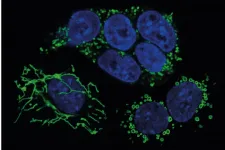(Press-News.org) A study led by D. Ross Camidge, MD, PhD, director of thoracic oncology at the University of Colorado School of Medicine and CU Cancer Center member, has helped to define MET amplification as a rare but potentially actionable driver for non-small cell lung cancer (NSCLC).
Camidge says many of the major developments in the treatment of non-small cell lung cancer have come from defining molecularly specific subsets of the disease for which researchers have been able to develop targeted treatments. Until now, all of these subsets have been based on either genetic mutations or gene rearrangements (where two separate genes fuse to create an oncogene).
"What we've started to realize is that non-small cell lung cancer isn't just one disease," Camidge says. "Over the last 15 or so years, we've started to pull apart separate diseases within that umbrella. Now, there are at least eight different molecularly specific subtypes with an FDA-approved therapy."
Gene amplification as cancer driver
The new paper, titled "Crizotinib in Patients With MET-Amplified NSCLC," and published in the June issue of the Journal of Thoracic Oncology, introduces a third means of defining NSCLC subsets that can be targeted with a specific drug. Rather than a mutation or a gene rearrangement, this third category represents oncogene activation through gene amplification. Gene amplification occurs when there is an increase in the usual number of copies of a particular gene, but the process can be difficult to identify.
"Unlike gene mutations or gene rearrangements -- which are either there or not -- gene amplification is a continuous variable," Camidge says. "How many extra copies do you need for it to make a difference? Is it an increase in just that one gene because it's so important to the cancer, or is it being dragged along for the ride by an increase in lots of other genes in the same part of the chromosome? Where do you put the cut point to say this level matters and this level does not? That's why identifying gene amplification as a definable driver of NSCLC has been challenging."
For this study, Camidge and the other investigators in the Pfizer-sponsored study focused specifically on MET amplification. MET is a gene that encodes a protein normally involved in cell growth. Although it is normally well-controlled, it can become dysregulated and drive some cancers' behavior. This can sometimes occur as a result of genetic mutations or gene rearrangement, but it can also occur through gene amplification.
If MET amplification is a cancer driver in some patients, then it stood to reason that inhibiting MET could slow or stop the progression of NSCLC in those patients.
To test that theory, the study required hospitals and cancer centers to screen tumor samples from NSCLC patients for MET amplification using a genetic test called fluorescence in situ hybridization (FISH). At CU and for several other sites, the MET FISH testing was performed by Marileila Varella-Garcia, PhD, a former professor of medical oncology at the School of Medicine (now retired).
During the study, a total of 88 patients with varying levels of MET amplification received crizotinib. Although crizotinib is currently licensed as an ALK (anaplastic lymphoma kinase) and ROS1 (c-ros oncogene 1) inhibitor for treatment of some other subtypes of NSCLC., it is also a MET inhibitor.
The results showed that patients with the highest levels of MET amplification responded to therapy with crizotinib at the highest rates, experiencing longer periods of tumor-progression-free survival, while patients with lower levels of MET amplification responded less favorably to the treatment.
The study, which started in 2006, is one of the largest efforts to define the relevant diagnostic test for meaningful levels of MET gene amplification and prove that MET-inhibitor drugs are effective for treating patients with NSCLC driven by MET amplification.
"It has been a long and difficult course for this rare subtype of lung cancer, but I think this is fairly good proof that there are some patients where MET amplification alone is driving their cancer," Camidge says.
Making the case for MET amplification testing and therapies
Camidge says that MET amplification-driven NSCLC is unique for a number of reasons. First, it's extremely rare, accounting for less than 1% of all NSCLCs.
Second, it tends to occur in patients who are not normally identified as having lung cancers with oncogenic drivers, including smokers and the elderly.
"It's not your classic driver oncogene subtype," he says. "It tends to break most of the rules we normally associate with driver oncogenes, which is that they are normally found in younger people and people who have never smoked. So, even if you're a smoker, even if you're older, if your doctor hasn't found a driver oncogene and they haven't looked for MET amplification, they should think about it."
"This is a truly actionable oncogene. It's rare, but it's real." - D. Ross Camidge, MD, PhD
Because of this, Camidge says that NSCLC patients without an identified driver oncogene should consider getting tested for MET amplification. He specifically recommends using the FISH testing method utilized in the study rather than relying solely on next generation sequencing, a different type of genetic testing that can return false negatives when it comes to identifying MET amplification.
"While some sequencing tests can reliably pick up gene amplification in a comparable manner to the FISH testing, others cannot," Camidge says. "It's all buried in the software that each commercial company or academic lab uses to analyze their sequencing data. I think pulling that apart will come in the near future as we better define what exactly we are looking for to make MET copy number information clinically relevant."
As for using MET inhibitors to treat patients with MET amplification-driven NSCLC, Camidge says drug companies are starting to explore MET amplification as an additional target for new and existing MET inhibitors, and that he hopes the team's findings will help inform that research and development to eventually help patients.
"This is a truly actionable oncogene," he says. "It's rare, but it's real."
INFORMATION:
As multicellular life relies on cell-cell interactions, it is not surprising that this is not always peaceful: cells with higher fitness eliminate cells with lower fitness through cell competition. Cell competition has emerged as a quality control mechanism and occurs when cells differ, genetically or otherwise, from each other. In mammals, the process of cell competition has been observed e.g., in cancer, during organ homeostasis, and during development as a process to select the fittest cells in the embryo and the adult. However, the features that distinguish "winner" from "loser" cells and whether there are key determinants for cell competition in various biological ...
PULLMAN, Wash. - When it comes to craft beer, the flavor doesn't have to be all in the hops. As a panel of amateur beer tasters at Washington State University recently demonstrated, malted barley, the number one ingredient in beer besides water, can have a range of desirable flavors too.
Researchers recruited a panel of about 100 craft beer drinkers to taste some so-called SMaSH beers--those brewed with a single barley malt and single hop. All the beers contained the same hop variety, called Tahoma, but each had a malt from a different barley genotype, or genetic makeup. Trained tasters can distinguish these easily, but even the untrained ...
An international group of researchers representing thousands of coral scientists across the globe is calling for new commitments and actions by the world's policymakers to protect and restore coral reefs.
In a paper presented July 20 at the International Coral Reef Symposium, the scientists said that the coming decade will likely offer the last chance for policymakers at all levels to prevent coral reefs "from heading towards world-wide collapse."
The paper, developed by the International Coral Reef Society, pushes for three strategies to save the reefs: addressing climate change, improving local conditions and actively restoring coral. ...
The female tsetse fly, which gives birth to adult-sized live young, produce weaker offspring as they get older, and when they feed on poor quality blood.
The study, carried out by researchers at the Universities of Bristol, Oxford and the Liverpool School of Tropical Medicine, was designed to measure how tsetse offspring health is influenced by their mothers' age, and how factors such as the mother's nutrition and mating experience might come into play.
In many animals, females show signs of reproductive ageing - where offspring health declines with maternal age - but there is huge variation within species in how rapidly this ageing occurs.
Scientists found that female tsetse that experience ...
For more than 20 years, Makoto Miyata from Osaka City University has been studying the gliding motility of the parasitic bacterium Mycoplasma mobile (M. mobile). It is a mechanism consisting of an external "grabbing" structure and internal "motor" - the motor having yet to be clarified on a molecular level. In collaboration with Osaka University and Kanazawa University, his research team used electron microscopy and high-speed atomic force microscopy (high-speed AFM) to reveal that the bacteria's molecular motor consists of two ATP synthase-like complexes, suggesting an unexpected evolution of the protein. Their findings were published in mBio.
Based on genetic information, researchers have suggested that the ...
Imagine you're a CEO who wants to promote an innovative new product -- a time management app or a fitness program. Should you send the product to Kim Kardashian in the hope that she'll love it and spread the word to her legions of Instagram followers? The answer would be 'yes' if successfully transmitting new ideas or behavior patterns was as simple as showing them to as many people as possible.
However, a forthcoming study in the journal Nature Communications finds that as prominent and revered as social influencers seem to be, in fact, they are unlikely to change a person's behavior by example -- and might actually be detrimental to the cause.
Why?
"When social influencers present ideas that are ...
A new scoping review found that those with chronic health concerns, such as diabetes, heart disease, cancer, and autoimmune conditions, are not only at a higher risk of severe COVID-19 infection, they are also more likely to experience anxiety, depression or substance use during the COVID-19 pandemic.
The aim of the review was to address knowledge gaps related to the prevention and management of mental health responses among those with chronic conditions. The findings, recently published in the International Journal of Environmental Research and Public Health, were based on a comprehensive review of 67 Chinese and English-language studies.
"Levels ...
A recent study in Frontiers in Sustainable Food Systems shows that the fruits of a type of tomato plant send electrical signals to the rest of the plant when they are infested by caterpillars. Plants have a multitude of chemical and hormonal signaling pathways, which are generally transmitted through the sap (the nutrient-rich water that moves through the plant). In the case of fruits, nutrients flow exclusively to the fruit and there has been little research into whether there is any communication in the opposite direction--i.e. from fruit to plant.
"We usually forget that a plant's fruits are living and semiautonomous parts of their mother-plants, far ...
ANN ARBOR, Mich. - As children made fewer visits to health facilities and engaged in social distancing and other COVID-19 mitigation measures, a smaller number of them also received prescription drugs, a new study suggests.
Overall, medications prescribed for children dropped by more than a quarter during the first eight months of the pandemic compared to the previous year, with the steepest declines in infection-related medicines like antibiotics and cough-and-cold drugs.
Antibiotic dispensing to children and teens plunged by nearly 56 % ...
An internal transporter that enables us to use the copper we consume in foods like shellfish and nuts to enable a host of vital body functions also has the essential role of protecting the receptor that enables us to grow new blood vessels when ours become diseased, Medical College of Georgia scientists report.
The findings published in the journal END ...




